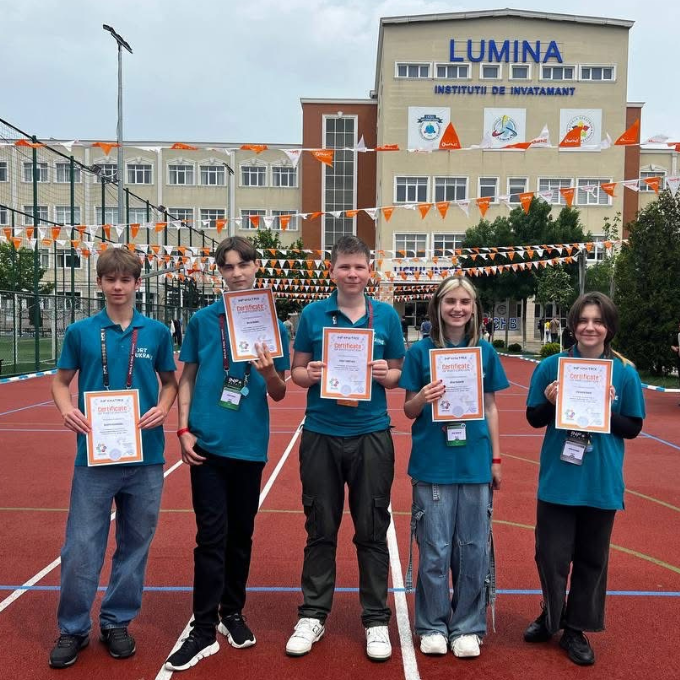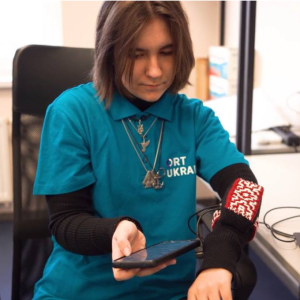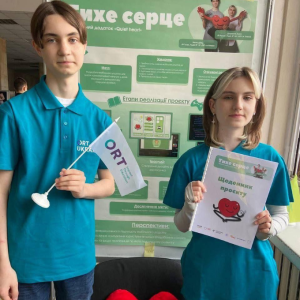

ORT students in Ukraine have been recognized with international awards for inventing devices aimed at helping citizens affected by war.
One design is a bracelet that recognizes potential threats for people with hearing problems. Another is a mobile app that aims to relieve psycho-emotional stress in children as young as six. Both projects won the students platinum awards at an international competition.
Viktoriia, 16, a pupil at Lyceum #141 “ORT” Kyiv, designed SoundAid, a smart bracelet that recognizes the name of the person wearing it as well as dangerous signals, such as car horns, sirens, and screams. If a potential threat is detected, the bracelet vibrates to alert the wearer to take care.

Viktoriia demonstrates her SoundAid bracelet
Her project won a platinum award at the world final of Infomatrix 2025, an international computer project competition held in Bucharest, Romania, in May.
Viktoriia, who was assisted by technology teacher Maksym Koroliov and headteacher Olha Rybak, learned about the problems of people with hearing impairments and, after talking to the Ukrainian Society of the Deaf, discovered that there were few devices to support them.
“My goal was to create an affordable and accessible device for people with hearing impairments,” Viktoriia explained. “Other target audiences were added, such as parents with young children and people who often wear headphones, but the device is still planned to be accessible to everyone.”
Meanwhile, 15-year-olds David and Alisa, also students at Lyceum #141 “ORT” Kyiv, won a platinum award for their project Quiet Heart, which aims to relieve some of the stress connected with the Ukraine war experienced by children aged six to nine and their teachers. These stressors include concern over the fate of relatives in the army, air raids, and loud noises.

David and Alisa designed the Quiet Heart app
Their schoolmates, Dmytro and Nazar, 14, who formed the ORT-2 team, won a silver medal for their entry in the Lego Sumo Robot category of the Infomatrix competition: a robot assembled and programmed on the EV3 controller.
ORT Ukraine provided the school in Kyiv with all the necessary equipment and all teachers of STEM subjects receive a salary supplement, supported by World ORT. The organization also partially covered the expenses of students and teachers to participate in the final of the world competition in Bucharest, as well as the round-trip travel.
Thanks again to the support of World ORT, ORT Ukraine was able to equip the school’s shelter with everything needed not only for the safe and comfortable stay of students and teachers, but also to continue the educational process. The school was also provided with uninterruptible power supplies, allowing the students to continue their education during power outages.
Yuliia Tkachuk, of ORT Ukraine, said the organization was proud of the achievements of its students and mentors. “This success is a clear indication of the strength of Ukrainian innovative education, as well as a confirmation of the high level of training of students and teachers of the ORT educational network,” she said. “No matter what, we teach, learn, inspire and support.”
People with hearing impairments often cannot hear important environmental sounds, which increases the risk of accidents, especially on roads. Existing devices are mostly focused on the high volume of the sound rather than the potential danger.
Viktoriia says SoundAid, which uses a neural network to analyze ambient sounds, can be used in everyday life as well as in specialized environments, such as workplaces with high noise levels. In the context of the war in Ukraine, people with hearing impairments are particularly vulnerable to dangers because they cannot hear alarms or approaching danger. SoundAid can be a critical tool for their safety in such conditions as well as more generally.
The prototype bracelet, which can be charged and turned on via a button, was created from a Raspberry Pi Zero 2 W board with vibrators and a connected microphone. These were provided by the school.
David and Alisa believe that because Generation Alpha (children aged between 0 and nine) were born into a digital world where smartphone use is ubiquitous, they will be receptive to receiving psychological help via a mobile app. They say they have not found suitable apps for children aged six to nine, therefore decided to design their own.
Their app, which aims to improve concentration during class, will focus on breathing, movement, distraction games, audio fairy tales, and cartoons with exercises. It can also be used with parental support at home and by psychologists.
“Children, especially young ones, are experiencing stress and psychological tension because of the war. They are all in a generation of smartphone users, so the idea of creating an app that will help relieve this situation was creative and everyone liked it,” explained Alisa. “After testing, the children said it helped them to relieve tension and stress, distract themselves and relax a little.”